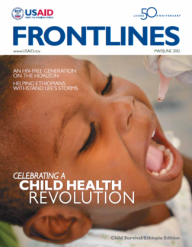 Bangladeshi women from Sylhet district serving as LAM (lactational amenorrhea method) ambassadors promote exclusive breastfeeding among their pregnant and postpartum neighbors and extended family members through household visits.
Dr. Sahahuddin Ahmed, Healthy Fertility Study
Bangladeshi women from Sylhet district serving as LAM (lactational amenorrhea method) ambassadors promote exclusive breastfeeding among their pregnant and postpartum neighbors and extended family members through household visits.
Dr. Sahahuddin Ahmed, Healthy Fertility Study
 Bangladeshi women from Sylhet district serving as LAM (lactational amenorrhea method) ambassadors promote exclusive breastfeeding among their pregnant and postpartum neighbors and extended family members through household visits.
Dr. Sahahuddin Ahmed, Healthy Fertility Study
Bangladeshi women from Sylhet district serving as LAM (lactational amenorrhea method) ambassadors promote exclusive breastfeeding among their pregnant and postpartum neighbors and extended family members through household visits.
Dr. Sahahuddin Ahmed, Healthy Fertility Study
Health Worker Article Series
Madagascar: Keeping Mothers Safe to Be Mothers
Kenya: Support from Clinic to Hospital to Home
Zambia: Coordinating Roles and Connecting with Care
Mozambique: Strength in Community Care
Bangladesh: Family Planning for Healthier Futures
Timor-Leste: Walking Together on the Long Road to Health
When her first child was only three months old, Laily Begum learned she was pregnant again. After giving birth, she had no idea that she could become pregnant before her menses returned, even though she was breastfeeding. Begum, 21, realized that within months she would be feeding and caring for a newborn infant and a 1-year-old daughter. After the birth of her second child, Begum was visited by a community health worker who provided information on how to delay her next pregnancy long enough to protect her health and make it easier to properly care for and feed all of her children. From that visit, Begum and her husband decided to practice family planning.
Forty percent of the 186 million pregnancies that occur in developing countries each year are unplanned, and many of them occur within a short interval of a previous birth. Studies have shown that when children are born less than two years apart, mothers and their babies face increased danger. The Sylhet district in Bangladesh, where Begum lives, has among the worst health indicators for women and children. The maternal mortality ratio is 471 deaths per 100,000 live births, the highest in the country.
In 2007, with USAID funding, Jhpiego and partners launched the Healthy Fertility Study in Sylhet district, a study designed to address unmet family planning needs in the postpartum period and provide a package of maternal and newborn interventions.
So far, the study results from 18 months postpartum have been promising: contraceptive use in the intervention area has increased 20 percent compared to the control area. In addition, through the promotion of the lactational amenorrhea method (LAM), which entails exclusive breastfeeding for six months, the practice and duration of exclusive breastfeeding has risen by 10 percent. Twenty-seven community health workers and eight community mobilizers have been trained in LAM since 2007 and have reached more than 5,000 women in Sylhet district.










Comment
Make a general inquiry or suggest an improvement.